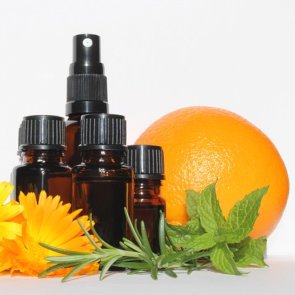Popular Types of Citrus Essential Oils and Their Use in Aromatherapy
 Citrus essential oils are popular in aromatherapy due to their distinctive invigorating aroma that boosts the mood and energy levels. In addition, each oil has a range of specific properties that can be beneficial for your physical and mental well-being. Let’s learn more about the popular types of citrus oils and their benefits.
Citrus essential oils are popular in aromatherapy due to their distinctive invigorating aroma that boosts the mood and energy levels. In addition, each oil has a range of specific properties that can be beneficial for your physical and mental well-being. Let’s learn more about the popular types of citrus oils and their benefits.Citrus essential oils are usually extracted from the leaves, flowers or rind of citrus fruits by steam distillation or cold pressing. The major component in the oils obtained from citrus fruit peels is limonene, a terpene hydrocarbon that gives citrus oils their clean, refreshing scent. Variations in aroma are produced by other minor constituents, which are unique to each citrus fruit.
Popular types of citrus essential oils include bergamot oil, citron oil (not to be confused with citronella oil obtained from some species of lemongrass), grapefruit oil, lemon oil, lime oil, mandarin oil, neroli oil, orange oil, petitgrain oil, and tangerine oil. Let’s take a closer look at some of them.
Lemon Oil
Lemon essential oil is one of the most popular and widely used citrus oils. It is cold pressed from the peel of the lemon fruit. Its scent is very similar to that of the fresh lemon fruit. Like most essential oils, lemon oil has strong antibacterial properties. It helps eliminate pathogenic bacteria and cleanses the air in your home. In addition, the smell of lemon oil boosts the mood and helps relax. When added to skincare products, this oil helps combat pigmentation and whitens the skin.
Orange Oil
Sweet orange oil, also known simply as orange oil, is another cold-pressed essential oil. It is usually extracted as a by-product of orange juice production. Its cheerful smell can be used to improve the aroma of a stale-smelling and smoky room. Orange oil helps unwind after a long day, alleviates anxiety, and has mild aphrodisiac properties. It also helps reduce inflammation, prevents infections, and boosts the immune system.
Bergamot Oil
Bergamot essential oil is derived from the rind of the bergamot orange fruit. It is a common flavoring that gives Earl Grey tea is unique taste and aroma. Unlike lemon and orange oil, it has a more subtle scent with floral notes. Bergamot oil relieves anxiety and depression, helps get rid of bad thoughts, and improves sleep. Oily skin can benefit from bergamot oil as a natural skincare product that normalizes sebum secretion and prevents acne (of course, you must never apply pure bergamot oil to your skin; you need to dilute it in a carrier oil or add several drops to your regular moisturizer).
Neroli Oil and Petitgrain Oil
These two essential oils are different from other citrus oils because they aren’t cold pressed from the fruit peel. Neroli oil is produced from the blossom of the bitter orange tree, and petitgrain oil is extracted from the leaves and green twigs of the same tree. Petitgrain oil has a greenish woody orange smell, while the smell of neroli oil is sweeter and warmer, with green and spicy notes. Both oils are widely used in perfumery. These oils are used in aromatherapy to combat insomnia, headaches, colds, and anxiety. They are said to alleviate stress, stimulates circulation, enhance mood, and reduce inflammation. When used in skincare products, oils obtained from bitter orange reduce the appearance of stretch marks and scars, as well as prevent premature skin aging.
Caution!
Despite all their benefits, citrus oils do have one considerable drawback. Cold-pressed citrus essential oils are phototoxic, which means they increase your skin’s sensitivity to ultraviolet light and may lead to sunburn. To protect your skin, you should wait approximately 12 hours after application before exposing your skin to direct sunlight.